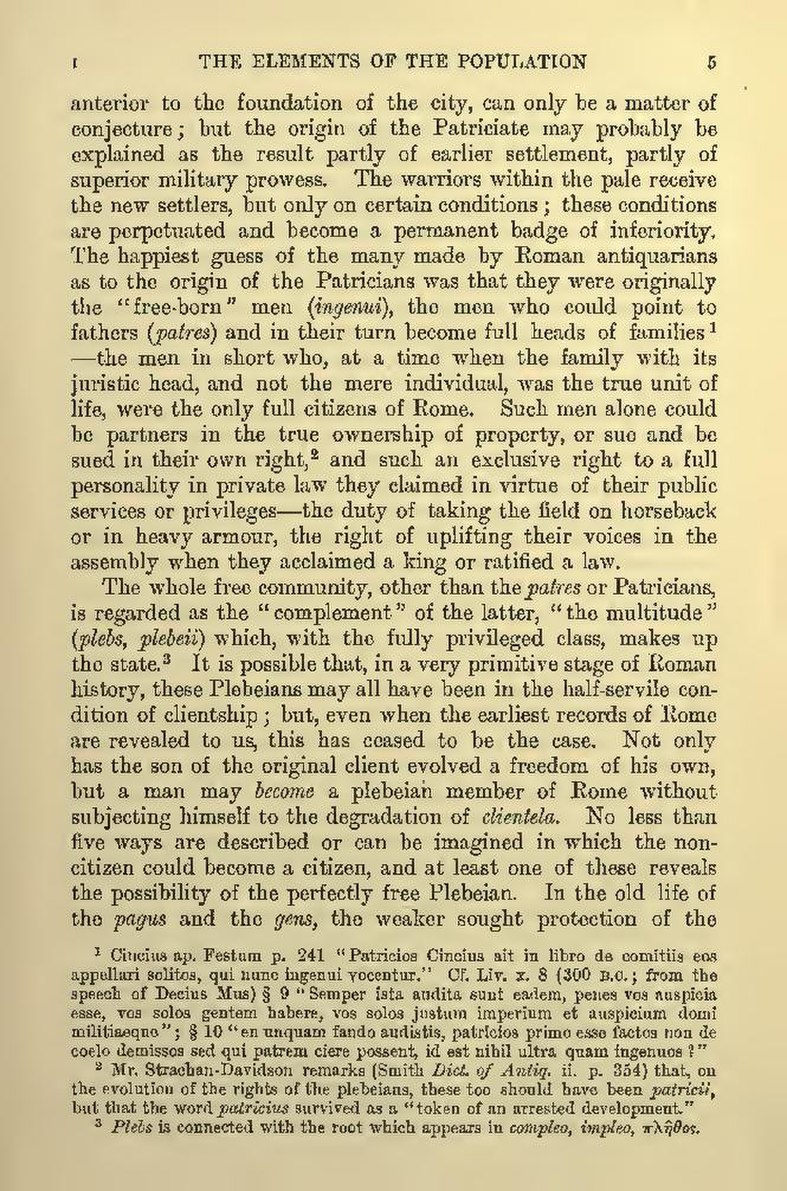anterior to the foundation of the city, can only be a matter of conjecture; but the origin of the Patriciate may probably be explained as the result partly of earlier settlement, partly of superior military prowess. The warriors within the pale receive the new settlers, but only on certain conditions; these conditions are perpetuated and become a permanent badge of inferiority. The happiest guess of the many made by Roman antiquarians as to the origin of the Patricians was that they were originally the "free-born" men (ingenui), the men who could point to fathers (patres) and in their turn become full heads of families[1]—the men in short who, at a time when the family with its juristic head, and not the mere individual, was the true unit of life, were the only full citizens of Rome. Such men alone could be partners in the true ownership of property, or sue and be sued in their own right,[2] and such an exclusive right to a full personality in private law they claimed in virtue of their public services or privileges—the duty of taking the field on horseback or in heavy armour, the right of uplifting their voices in the assembly when they acclaimed a king or ratified a law.
The whole free community, other than the patres or Patricians, is regarded as the "complement" of the latter, "the multitude" (plebs, plebeii) which, with the fully privileged class, makes up the state.[3] It is possible that, in a very primitive stage of Roman history, these Plebeians may all have been in the half-servile condition of clientship; but, even when the earliest records of Rome are revealed to us, this has ceased to be the case. Not only has the son of the original client evolved a freedom of his own, but a man may become a plebeian member of Rome without subjecting himself to the degradation of clientela. No less than five ways are described or can be imagined in which the non-citizen could become a citizen, and at least one of these reveals the possibility of the perfectly free Plebeian. In the old life of the pagus and the gens, the weaker sought protection of the.]
- ↑ Cincius ap. Festum p. 241 "Patricios Cincius ait in libro de comitiis eos appellari solitos, qui nunc ingenui vocentur." Cf. Liv. x. 8 (300 B.C.; from the speech of Decius Mus) § 9 "Semper ista audita sunt eadem, penes vos auspicia esse, vos solos gentem habere, vos solos justum imperium et auspicium domi militiaeque"; § 10 "en unquam fando audistis, patricios primo esse factos non de coelo demissos sed qui patrem ciere possent, id est nihil ultra quam ingenuos?"
- ↑ Mr. Strachan-Davidson remarks (Smith Dict. of Antiq. ii. p. 354) that, on the evolution of the rights of the plebeians, these too should have been patricii, but that the word patricius survived as a "token of an arrested development."
- ↑ Plebs is connected with the root which appears in compleo, impleo, [Greek: plêthos
